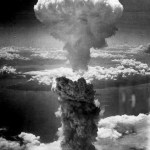"Ours is a world of nuclear giants and ethical infants. We know more about war that we know about peace, more about killing that we know about living." -Omar N. Bradley
Nuclear physics is one of the most daunting, emotionally charged phrases in all of science. You can hardly say the words without the image of a mushroom cloud popping into most people's heads, followed by the devastations of radiation sickness and lingering radioactivity.
Image credit: National Archives image (208-N-43888), Charles Levy, of the Nagasaki bomb.
But -- as a physicist -- that's not what I think of at all.
Think…
radiation poisoning
For comic book characters, big doses of radiation are a surefire way of acquiring awesome superpowers, but in real life, the results aren't quite as glamorous. A victim of acute radiation poisoning can look forward to hair loss, bleeding, the destruction of their white blood cells and bone marrow, and severe damage to their spleen, stomach and intestines.
Radiation doesn't kill cells directly, but it can cause so much damage that they commit suicide, by enacting a failsafe program called apoptosis. Now, Lyudmila Burdelya and colleagues from Roswell Park Cancer Institute have found a…
